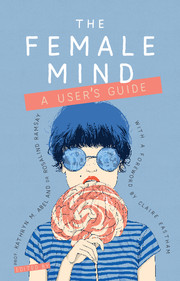Book contents
- Frontmatter
- Acknowledgements
- Contents
- Foreword
- Introduction: being female
- Part I Women in perspective
- Part II Women and society
- Part III Women and their environment
- 10 Emotional well-being and staying well
- 11 Sensitive motherhood
- 12 Religion and spirituality
- 13 Linking physical and mental health in women
- 14 Obesity
- 15 Women and sleep
- 16 Women and pain
- 17 Bereavement, loss and grief
- Part IV Women and specific disorders
- Part V Women and treatment
- Contributors
- Index
12 - Religion and spirituality
from Part III - Women and their environment
Published online by Cambridge University Press: 02 January 2018
- Frontmatter
- Acknowledgements
- Contents
- Foreword
- Introduction: being female
- Part I Women in perspective
- Part II Women and society
- Part III Women and their environment
- 10 Emotional well-being and staying well
- 11 Sensitive motherhood
- 12 Religion and spirituality
- 13 Linking physical and mental health in women
- 14 Obesity
- 15 Women and sleep
- 16 Women and pain
- 17 Bereavement, loss and grief
- Part IV Women and specific disorders
- Part V Women and treatment
- Contributors
- Index
Summary
Sonia's story
Sonia had always been part of her faith community, which
she found supportive at many times during her life. She attended worship on a regular basis, but more recently her weekly attendance had turned into a daily routine and she became distressed when other responsibilities in her life threatened to disrupt the frequency of her visits. Sonia's partner became increasingly concerned about this change in her lifestyle and contacted her general practitioner (GP), who suggested that Sonia might find it helpful to discuss this with a spiritual advisor. It emerged that Sonia was very anxious about her elderly mother, who had been diagnosed with a heart condition. When she was able to discuss this with the spiritual advisor, her anxiety lessened. She was appreciative of being able to speak about what was happening in her wider relationships in the light of her faith.
When people are unwell or experience some kind of distress, they usually search for an explanation for their condition, its cause and what might help their recovery. In addition to searching for physical explanations and treatments, they might focus more deeply on the meaning of what is happening in their lives as a whole.
Spirituality v. religion
Many people do not have a specific religion, but still refer to spiritual needs and resources, particularly at difficult times. For instance, they might say, ‘I'm not a religious person, but I do think of myself as spiritual’. Spirituality and religion are integrally related, but there are important distinctions to be made.
Spirituality is concerned with the search for ultimate meaning, truth and orientation in life. There are many dimensions, and many individual expressions, of spirituality. Religion in its many forms – worship, ritual, prayer, social groupings and so on – is a more ‘corporate’ concept. Spirituality often expresses itself through religion, but it tends to be a more personal concept, concerned with meanings and essential values. It is often important to be able to see beyond what seems to be a ‘religious’ problem to discover the meanings that individuals attribute to their lives and challenges. Sonia's story is a good example of this, where the increasingly obsessive religious behaviour is secondary to (and could indicate) underlying spiritual/existential concerns.
- Type
- Chapter
- Information
- The Female MindUser's Guide, pp. 77 - 82Publisher: Royal College of PsychiatristsPrint publication year: 2017

